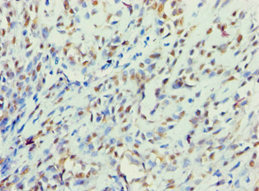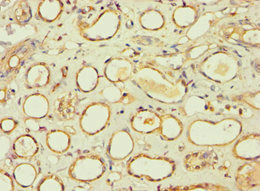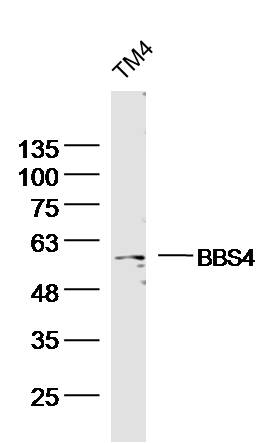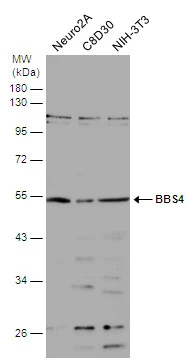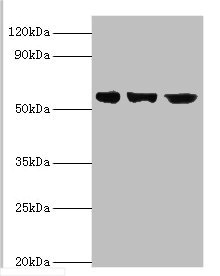
Western blot All lanes: Bardet-Biedl syndrome 4 protein antibody at 4ug/ml Lane 1: Hela whole cell lysate Lane 2: U251 whole cell lysate Lane 2: Mouse heart tissue Secondary Goat polyclonal to rabbit IgG at 1/10000 dilution Predicted band size: 59, 60, 39 kDa Observed band size: 59 kDa
BBS4 Antibody
CSB-PA839407ESR2HU
ApplicationsWestern Blot, ELISA, ImmunoHistoChemistry
Product group Antibodies
ReactivityHuman, Mouse
TargetBBS4
Overview
- SupplierCusabio
- Product NameBBS4 Antibody
- Delivery Days Customer20
- ApplicationsWestern Blot, ELISA, ImmunoHistoChemistry
- CertificationResearch Use Only
- ClonalityPolyclonal
- ConjugateUnconjugated
- Gene ID585
- Target nameBBS4
- Target descriptionBardet-Biedl syndrome 4
- Target synonymsBBSome complex member BBS4, bardet-Biedl syndrome 4 protein
- HostRabbit
- IsotypeIgG
- Protein IDQ96RK4
- Protein NameBBSome complex member BBS4
- Scientific DescriptionThe BBSome complex is thought to function as a coat complex required for sorting of specific membrane proteins to the primary cilia. The BBSome complex is required for ciliogenesis but is dispensable for centriolar satellite function. This ciliogenic function is mediated in part by the Rab8 GDP/GTP exchange factor, which localizes to the basal body and contacts the BBSome. Rab8(GTP) enters the primary cilium and promotes extension of the ciliary membrane. Firstly the BBSome associates with the ciliary membrane and binds to RAB3IP/Rabin8, the guanosyl exchange factor (GEF) for Rab8 and then the Rab8-GTP localizes to the cilium and promotes docking and fusion of carrier vesicles to the base of the ciliary membrane. The BBSome complex, together with the LTZL1, controls SMO ciliary trafficking and contributes to the sonic hedgehog (SHH) pathway regulation. Required for proper BBSome complex assembly and its ciliary localization. Required for microtubule anchoring at the centrosome but not for microtubule nucleation. May be required for the dynein-mediated transport of pericentriolar proteins to the centrosome.
- ReactivityHuman, Mouse
- Storage Instruction-20°C or -80°C
- UNSPSC41116161

